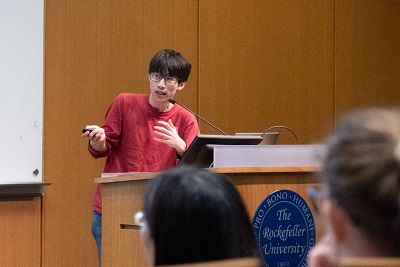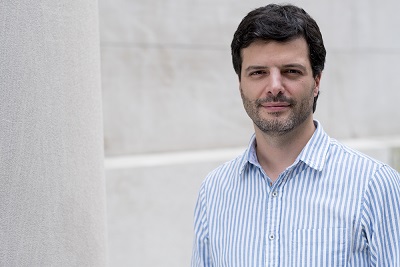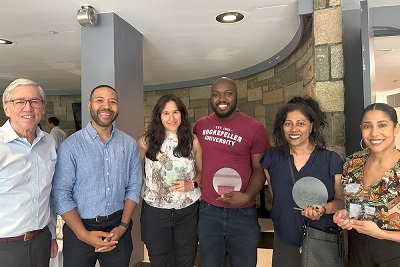Convocation 2021 caps a year like no other

A screenshot from the virtual convocation ceremony.
Thirty-three students received Rockefeller Ph.D.s on June 10 at the university’s 63rd Convocation, which for the second time is being held via video conference to prevent the spread of COVID-19 and comply with state and city health guidelines related to the pandemic. For the class of 2021, the event was a celebration of years of study and the successful completion of a thesis. But was also a tribute to their resilience and their ability to forge new ways of conducting science during an unprecedented national emergency.
Graduate students in all phases of their studies at Rockefeller faced unique challenges during this pandemic year. Experiments were postponed, data analysis and writing work was conducted from home, and meetings were held via zoom. Laboratory space was subject to capacity limitations, forcing trainees to carefully schedule their time and in some cases work during odd hours, balancing science with other responsibilities such as children’s remote learning needs.
“What speaks to the passion, drive, and talent of our student body is how they managed to do all this at the highest levels of their respective fields,” said Sidney Strickland, dean of graduate and postgraduate studies. “I want this class of students to know how much I admire their resilience and their creativity as scientists.”
For incoming students at the beginning of their graduate school careers, in addition to concerns for their health and that of their families, there was a bevy of travel constraints and quarantine requirements before they could even get started. (Overall, 23 new graduate students from nine countries arrived at Rockefeller in the fall after navigating the rapidly changing pandemic-landscape. Another five students from China also matriculated remotely, due to travel restrictions and consular closures.)
Beyond shifting to virtual orientations, classes, office hours, and lab rotations, graduate students also spearheaded and led a new peer-to-peer-mentoring program. In consultation with the Dean’s Office, third and fourth year students Audrey Goldfarb and Irene Duba surveyed incoming and existing students and matched mentors and mentees based on their areas of scientific interest. Over the past several months, students have been meeting over Zoom, and whenever possible in-person, providing personal insights into the process of selecting lab rotations, setting up schedules, and submitting research proposals.
“I’m so proud of our students at every level of their graduate careers,” said Emily Harms, Rockefeller’s Senior Associate Dean for Graduate Studies. “Graduate students are a cornerstone of Rockefeller’s community and even in deeply trying times they’ve managed to be both innovative scientists and wonderfully collegial and caring toward one another.”
This year’s graduates are Sanjeethan Baksh, Caner Çağlar, Steven Cajamarca, Vikram Chandra, Du Cheng, Jingyi Chi, Pavan Choppakatla, Juliel Espinosa, Margaret Fabiszak, Daniel Firester, Caitlin Sun Gilbert, Rohiverth Guarecuco Jr., Nicole Rai Infarinato, Veronica Jové, Rachel Leicher, Solomon N Levin, Fangyu Liu, Olivia Maguire, Fanny Matheis, Elisabeth Murphy, Kristina Navrazhina, Tiên Minh Thủy Phan-Everson, Jakob Træland Rostøl, Artem Serganov, Rohan R. Soman, Elitsa Stoyanova, Tony Sun, Taku Tsukidate, Putianqi Wang, Xiao Wang, Ross Weber, Robert Williams, and Xiphias Ge Zhu.
During the convocation webcast, which was hosted by Rockefeller President, Richard P. Lifton, honorary degrees were also presented to Trustee Emeritus Henry R. Kravis and Marie-Josée Kravis; and longtime members of the board’s Committee on Scientific Affairs Tom Maniatis and Pippa Marrack.


